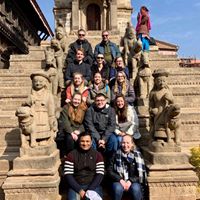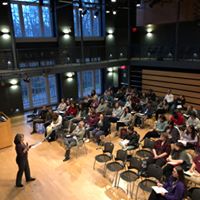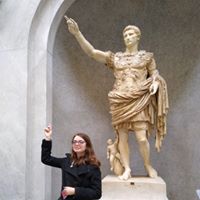Religious Studies
Religion plays a crucial role in human experience and society. It influences individual lives, art, literature, politics, and indeed, every aspect of culture. The discipline’s broad scope makes the study of religion inherently interdisciplinary. As such the major is meaningfully connected to most other disciplines and can be a valuable major or double-major for a range of professional interests.
The Program in Religious Studies aims neither to promote nor undermine any specific religion or belief. As an academic discipline, it seeks to understand religion by studying it outside of the framework of any particular system of belief. Courses are designed to acquaint students with the world’s major religious traditions, texts, and figures. Students explore the historical and cultural impact of religion in such areas of literature, scripture formation, law, politics, and ethics. In the process, they gain appreciation for diversity and develop the ability to discuss religion with critical discernment. The Program in Religion fosters personal attention. The major offers a high degree of flexibility, and individual interests are encouraged.
What can you do with a degree in Religious Studies?
While some Religious Studies majors continue in graduate school intent on careers in teaching and research, the large majority use the tools developed in the major (clear critical thinking, persuasive writing, oral communication, and research skills) to develop careers in diverse fields, including public relations, journalism, business, teaching, service organizations, and the arts. Others have gone on to graduate programs in library science, law, social work, and the ministry.
The Religious Studies Major
The major in Religious Studies is flexible and is often completed as a double major with other CAS majors. Major requirements total 30 credit hours of study and require that all students take RELG 101 (Introduction to World Religions) and RELG 102 (Introduction to the Study of Religion). Beyond those introductory courses, all RELG majors must take one course in what are referred to as Abrahamic traditions (choose from RELG 103, RELG 117, RELG 201, RELG 205, RELG 206, RELG 208, RELG 210, RELG 252, or RELG 253) and one course in a non-Abrahamic tradition (choose from RELG 251, RELG 283, RELG 284, RELG 383, or RELG 384). The major also requires at least three courses of the student’s choice at the 300-level and either an additional 300-level course or RELG 401.
For information about our Honors, Awards, and Scholarships, click here.
Faculty
Professor Mary Beth Mathews, Director of the Khatib Center for Religious Dialogue.
American and European Religious History, Christian Fundamentalism, and African American Religions
Associate Professor Jennifer Barry
Early Christianity, Late Antiquity, Women’s and Gender Studies
Assistant Professor Kalpesh Bhatt,Co-Director of the Leidecker Center for Asian Studies.


